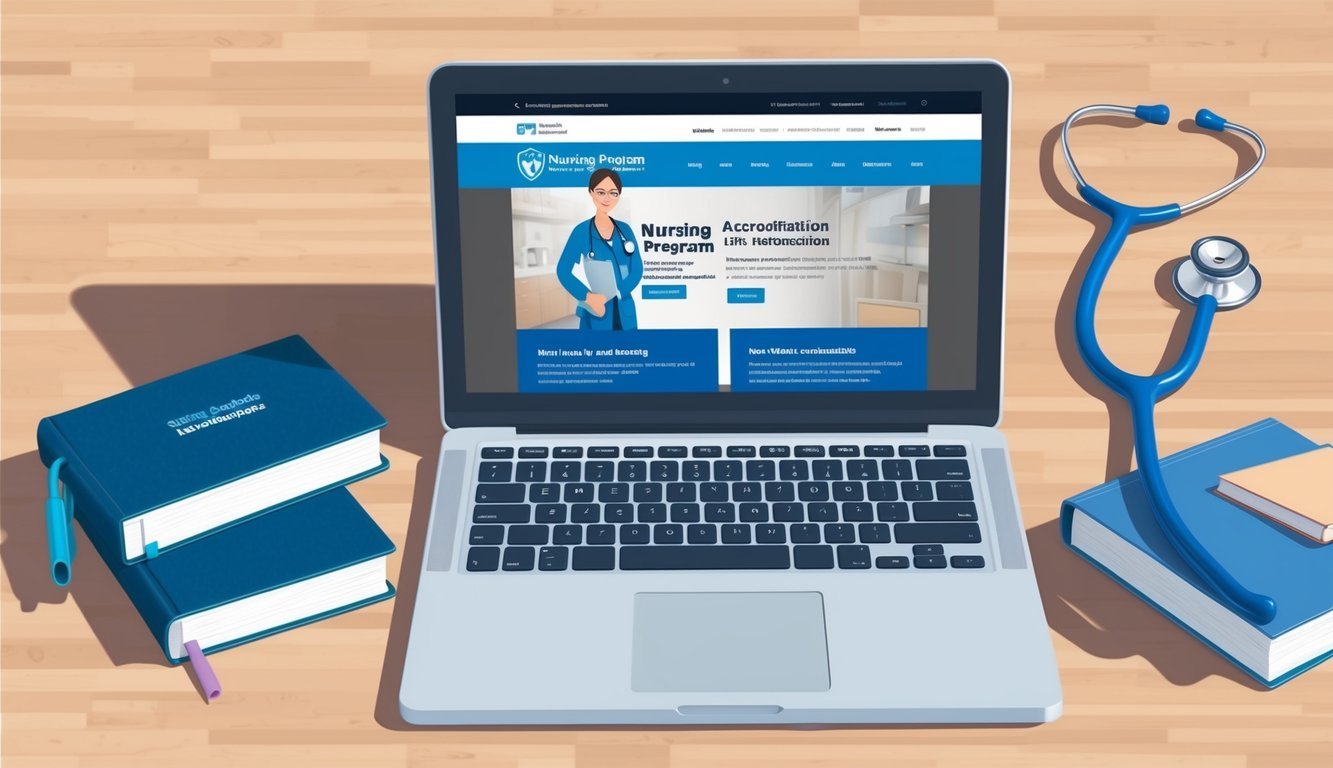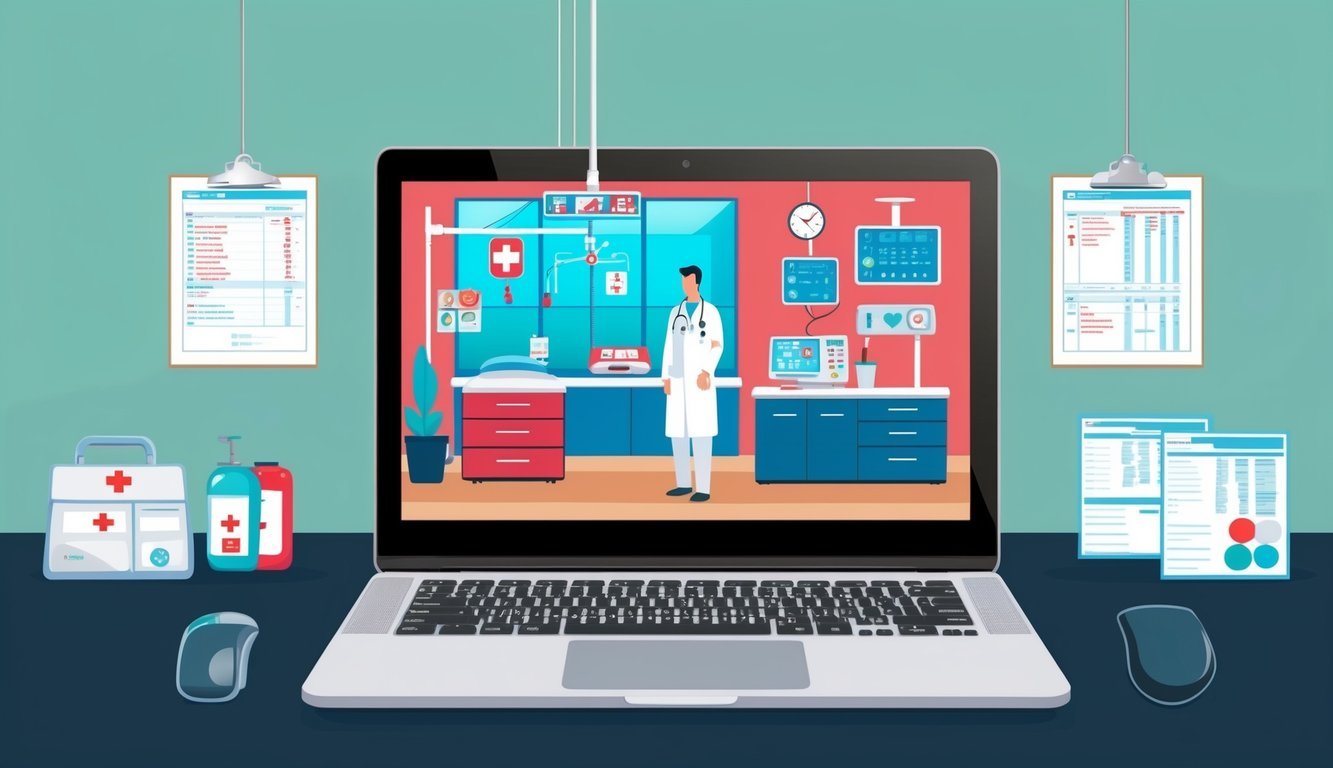Choosing an online associate nursing program can be an important step in advancing your career in healthcare.
Many students appreciate the flexibility and convenience of earning a degree while balancing work and personal commitments.
These fully online programs often allow you to complete your coursework from home.
They also provide essential clinical training through local partnerships.
Accredited programs ensure that you receive quality education that meets national standards.
As you prepare for the NCLEX-RN exam, you’ll gain the foundational knowledge and clinical skills needed for success in nursing.
After earning your associate degree, numerous career pathways open up to you, from registered nursing to advanced practice areas.
Key Takeaways
- Online associate nursing programs offer flexible learning that fits your schedule.
- Accreditation is vital for quality education and successful exam preparation.
- Graduates have various career options in the nursing field after earning their degree.
Overview of Online Associate Nursing Programs
Online associate nursing programs provide a flexible path to a nursing career.
You can earn your degree while balancing work, family, or other commitments.
These programs combine theoretical knowledge with practical skill development, preparing you for the nursing field.
Advantages of Online ADN Programs
One of the main benefits of online Associate Degree in Nursing (ADN) programs is their flexibility.
You can attend classes from anywhere, making it easier to fit education into your life.
This format is ideal for those who need to work while studying.
Another advantage is the accessibility of course materials.
Many programs allow you to review lectures and assignments at your own pace.
This convenience helps you grasp complex topics better.
Cost-effectiveness is also a significant factor.
Online programs often have lower tuition and reduced commuting costs.
Overall, online ADN programs meet the growing demand for qualified nurses in healthcare.
Many institutions, like those listed on Best Health Degrees, offer accredited online options.
Understanding the ADN Curriculum
The curriculum of an online Associate Degree in Nursing typically includes a mix of theory and hands-on experience.
You will study essential subjects like anatomy, pharmacology, and nursing ethics.
Many programs include specialized courses, such as maternal-child health or mental health nursing.
These courses prepare you for certain roles within the healthcare system.
You will also engage in virtual simulations to apply your knowledge.
Clinical experiences may occur at local healthcare facilities, providing essential real-world practice.
Here’s a quick overview of common subjects in an ADN program:
| Course | Description |
|---|---|
| Anatomy and Physiology | Study of body systems and their functions |
| Nursing Fundamentals | Introduction to basic nursing practices |
| Pharmacology | Understanding medications and their effects |
| Mental Health Nursing | Focus on psychiatric care and treatment methods |
These elements work together to ensure you are well-prepared for nursing roles after graduation.
Programs often hold high retention rates and acceptance rates, reflecting their effectiveness in supporting students.
Accreditation and Educational Standards

Accreditation is crucial for ensuring that your nursing education meets established educational standards.
This section covers the significance of accreditation and highlights key accrediting bodies that oversee nursing programs.
The Importance of Accreditation
Accreditation confirms that a nursing program meets quality standards set by professional organizations.
It ensures that the program prepares you effectively for a career in nursing.
Attending an accredited program is often necessary for licensure and employment.
Without accreditation, your degree may not be recognized by employers or licensing boards.
This can limit your job opportunities and affect your earning potential.
Additionally, many states require a degree from an accredited program to take the NCLEX-RN exam.
Being part of an accredited program can also provide access to federal financial aid and scholarships.
This can significantly reduce the cost of your education.
Key Accrediting Bodies for Nursing Programs
Several organizations accredit nursing programs in the United States.
Here are some of the most recognized:
| Accreditation Body | Overview |
|---|---|
| Accreditation Commission for Education in Nursing (ACEN) | Focuses on nursing education programs at all degree levels. |
| Commission on Collegiate Nursing Education (CCNE) | Evaluates programs that offer bachelor’s and higher degrees. |
| National League for Nursing Commission for Nursing Education Accreditation (NLN CNEA) | Accredit nursing programs with a focus on the educational quality. |
Selecting a program accredited by these bodies can assure you of a quality education.
Accreditation not only supports your educational journey but also enhances your career prospects in the nursing field.
For more details on accredited nursing programs, you can refer to resources such as Nursing School Hub or American Association of Colleges of Nursing.
Clinical Experience and Online Simulation

In online associate nursing programs, gaining clinical experience is essential.
This experience often combines real-life practice with innovative technology.
You will learn how online courses incorporate clinical hours and utilize simulation tools to develop essential nursing skills.
Integrating Clinical Hours in Online Programs
Most online associate nursing programs require students to complete a certain number of clinical hours to gain hands-on experience.
Typically, you will connect with local healthcare facilities to fulfill these hours.
This can be hospitals, clinics, or community health organizations.
These partnerships help you apply theoretical knowledge in real-world settings.
For example, a program might require 540 clinical hours, divided between various departments.
These include:
- Medical-Surgical Nursing
- Pediatric Care
- Maternal-Newborn Nursing
By engaging in these environments, you enhance your nursing skills and prepare for patient interactions.
Simulation and Virtual Learning Tools
Simulation is a key component of online nursing education.
It allows you to practice nursing skills without needing to be in a physical setting.
Through virtual learning tools, you engage with scenarios that mimic real-life situations.
This includes using advanced simulation software or virtual environments.
These tools cover various skills such as:
- Patient assessment
- Medication administration
- Emergency response
You can safely make decisions and learn from mistakes.
Many programs utilize simulations that align with the curriculum, allowing you to meet your clinical hour requirements effectively.
For more information on online nursing programs, check out Best Health Degrees and EduMed.
Preparing for the NCLEX-RN Exam
Successfully passing the NCLEX-RN exam is essential for becoming a registered nurse.
This section will provide you with study strategies and key information about eligibility and the content of the exam.
Study Strategies for the NCLEX
To prepare for the NCLEX-RN exam, you need effective study strategies.
Start by creating a study schedule that allows ample time to review all material.
Break your study sessions into manageable chunks.
Consider using NCLEX prep books and resources available online.
Practice questions are vital for understanding the exam’s format.
Review the test plan provided by the National Council of State Boards of Nursing (NCSBN), which outlines the topics covered.
Join a study group to stay motivated and gain different perspectives.
You can also utilize online forums to connect with other nursing students.
Lastly, take advantage of mock exams to assess your readiness and identify weak areas.
Understanding NCLEX Eligibility and Content
Before taking the NCLEX-RN, confirm your eligibility.
You typically need to complete an accredited nursing program, including an associate degree or higher.
After graduation, you will apply for authorization to take the exam through your state’s board of nursing.
The NCLEX-RN assesses various areas including safe and effective care, health promotion, and psychosocial integrity.
The exam includes multiple-choice questions, as well as other formats like select-all-that-apply questions.
Familiarize yourself with the candidate bulletin from the NCSBN for detailed content outlines and expectations.
This document will help you understand what knowledge areas you should focus on during your study efforts.
Career Pathways After Earning an Associate Degree in Nursing

Earning an Associate Degree in Nursing (ADN) opens up many opportunities in the healthcare field.
You can either transition to a Bachelor of Science in Nursing (BSN) or step directly into various nursing roles.
Here are the key pathways you can take.
Transitioning from ADN to BSN
If you want to further your education, you can transition from your ADN to a BSN.
Many schools offer RN-to-BSN programs designed for ADN graduates.
These programs typically take 1-2 years to complete.
They focus on advanced nursing topics, leadership, and community health.
Benefits of a BSN include:
- Greater job opportunities
- Higher salary potential
- Increased knowledge and skills in patient care
Statistics show that employers often prefer BSN nurses.
This preference can lead to better job placement rates.
Job Opportunities for ADN Graduates
With an ADN, you qualify for several nursing jobs.
Most ADN graduates become registered nurses (RNs).
Here are some common job settings where you can work:
| Healthcare Facility | Typical Roles |
|---|---|
| Hospitals | Staff Nurse, Charge Nurse |
| Clinics | Outpatient RN, Nurse Educator |
| Long-term Care Facilities | Gerontology Nurse |
| Home Health Agencies | Home Health Nurse |
You can find ADN graduates in various nursing roles, focused on patient care in different healthcare settings.
The demand for nurses is strong, making this a promising career choice.
Frequently Asked Questions
When considering an online Associate Degree in Nursing (ADN) program, you might have several questions.
Here are some important details about prerequisites, duration, accreditation, clinical requirements, licensure exams, and career prospects.
What are the prerequisites for enrolling in an online Associate Degree in Nursing (ADN) program?
Most online ADN programs require a high school diploma or GED.
Some programs may ask for specific coursework, like biology or chemistry.
It is advisable to check the specific requirements of each program since they can vary.
How long does it typically take to complete an online ADN program?
An online ADN program generally takes about two years to complete if you attend full time.
Some schools offer accelerated pathways, allowing you to finish sooner.
Part-time options are also available, which may extend the duration.
Are there any online ADN programs that are accredited and recognized by nursing boards?
Yes, agencies like the Accreditation Commission for Education in Nursing (ACEN) or the National League for Nursing Commission for Nursing Education Accreditation (NLN CNEA) accredit many online ADN programs.
You can verify accreditation through the program’s website or the appropriate nursing board.
What clinical requirements do online associate nursing programs have and how are they fulfilled?
Online ADN programs typically require students to complete clinical hours in healthcare settings.
You may fulfill these hours at local hospitals or clinics, arranged by the school.
Some programs offer virtual simulations to supplement clinical practice.
How does the NCLEX-RN licensure exam process work for graduates of online associate nursing programs?
After completing your ADN, you must pass the NCLEX-RN exam to become a licensed registered nurse.
The application process involves registration, paying fees, and scheduling an exam date.
Make sure your program meets the state requirements for eligibility.
What are the career prospects for nurses with an Associate Degree obtained through an online program?
Nurses with an ADN can find job opportunities in hospitals, clinics, and community health settings.
The demand for registered nurses continues to grow, making this a solid career choice.
With experience and further education, you can advance to higher positions in nursing.

